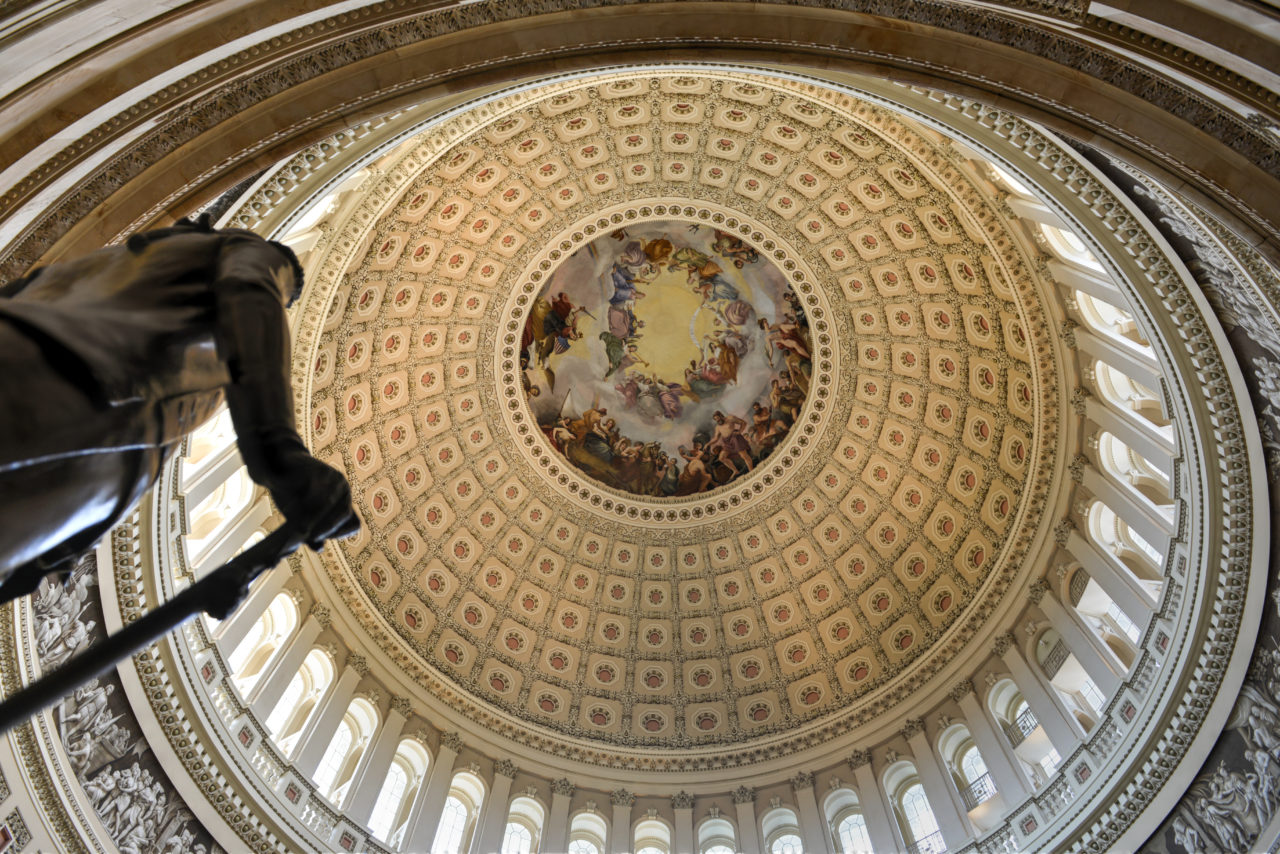Every month, we pick a few topics for exploration. The topics we select aren’t meant to cover every issue area facing the progressive community, but rather to give actionable advice on how to talk about key issue areas. This month we focused on:
What do Americans believe – or even know – about potential reforms to make our government more open and fair?
Reformers are turning their sights to fundamental questions about how American government is broken – and who has representation. The public shares an interest in these core values, but low awareness of specific proposals makes framing and education particularly important. The debate over the future of America’s democracy is just taking shape.
How are this year’s tax returns affecting perceptions of Republican tax policies?
Americans remain opposed to the Republican tax law now that they have seen what it means for their own finances. Progressives are in a strong position to continue arguing the Trump administration puts the wealthy ahead of the middle class.
What does the public think about William Barr’s summary of the Special Counsel report?
The president has claimed “total exoneration,” but most Americans have lingering doubts or see the Attorney General’s summary as “inconclusive” on core questions of wrongdoing – and there are growing fears Trump will get away with his misdeeds.
1 | The Case for Reform
Political reforms get mixed reviews, but generally score better with high-information voters.
House Democrats recently passed HR1, a sweeping bill to improve both oversight in American government and the way elections are run in the United States, an effort Navigator examined in January. This month, Navigator examined a suite of new proposals that go beyond HR1: bigger ideas geared at bolder electoral and political reforms.
These ideas, which have gotten some oxygen at the early stages of the Democratic presidential primary process, had been off the map of mainstream political conversation. And, while some of these proposals examined may be familiar to close observers of American politics, the latest survey makes clear considerable education is necessary and could lead to stronger support for many of the policies in question.
Remember “first principles”
Besides adding context in the form of detail, communicators can also add context in the form of “first principles” – the underlying ideals motivating specific proposals. For example, on its own, “increasing the number of justices on the Supreme Court” garners only 26% support – but 87% want to ensure no single appointee has too much power. Intensity is also especially high with these principles: 47% strongly support ensuring “every American has full representation in Congress” compared to 34% strong support when limited to “Puerto Rico.”
Reformers shouldn’t assume public awareness of reform proposals.
Navigator asked two questions about each policy in the survey: awareness and support. Overall awareness of the policies was low. The most familiar policy is the abolition of the Electoral College for presidential elections, which 55% say they have heard “some” or “a lot” about. Almost half (47%) had also heard about the restoration of voting rights to individuals with past felony convictions. Beyond that, none of the other eight policies are well-known by more than a third of the country (33% for Puerto Rican statehood). Only 22% of respondents had heard a lot or some about five or more policies from the list.
However, most of the policies are popular despite the lack of awareness. Of the 12 policies tested, eight receive positive net support overall. And all but four policies are especially popular among the 22% of respondents who have heard about five policies or more – a group that is slightly better educated (44% have a college degree, compared to 37% overall), but politically similar (36% liberal compared to 30% overall) to the public at large.
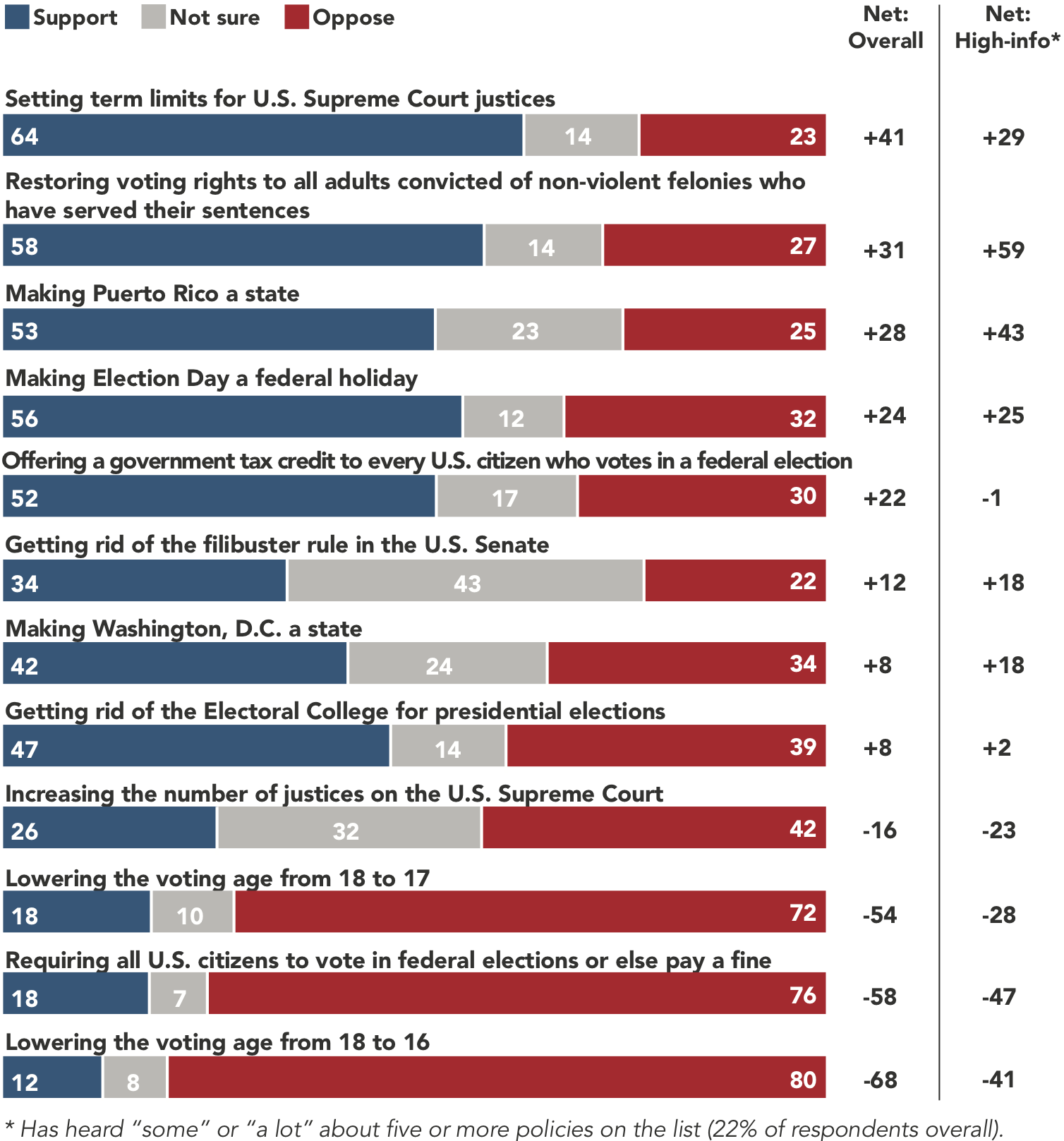
With novel reforms, a little context goes a long way.
Getting a critical mass of voters into the “high-information” category with regard to political reforms won’t be easy. But this edition of Navigator also demonstrates that even small amounts of context – down to a few words, in some cases – can have a big impact.
Half of respondents were shown a description of each policy with no detail (Split A), and half were shown a description with greater detail (Split B). The findings show that, while connecting some of the policies to American values like representation or appreciation for the military will increase support, getting into the weeds can sometimes do more harm than good.
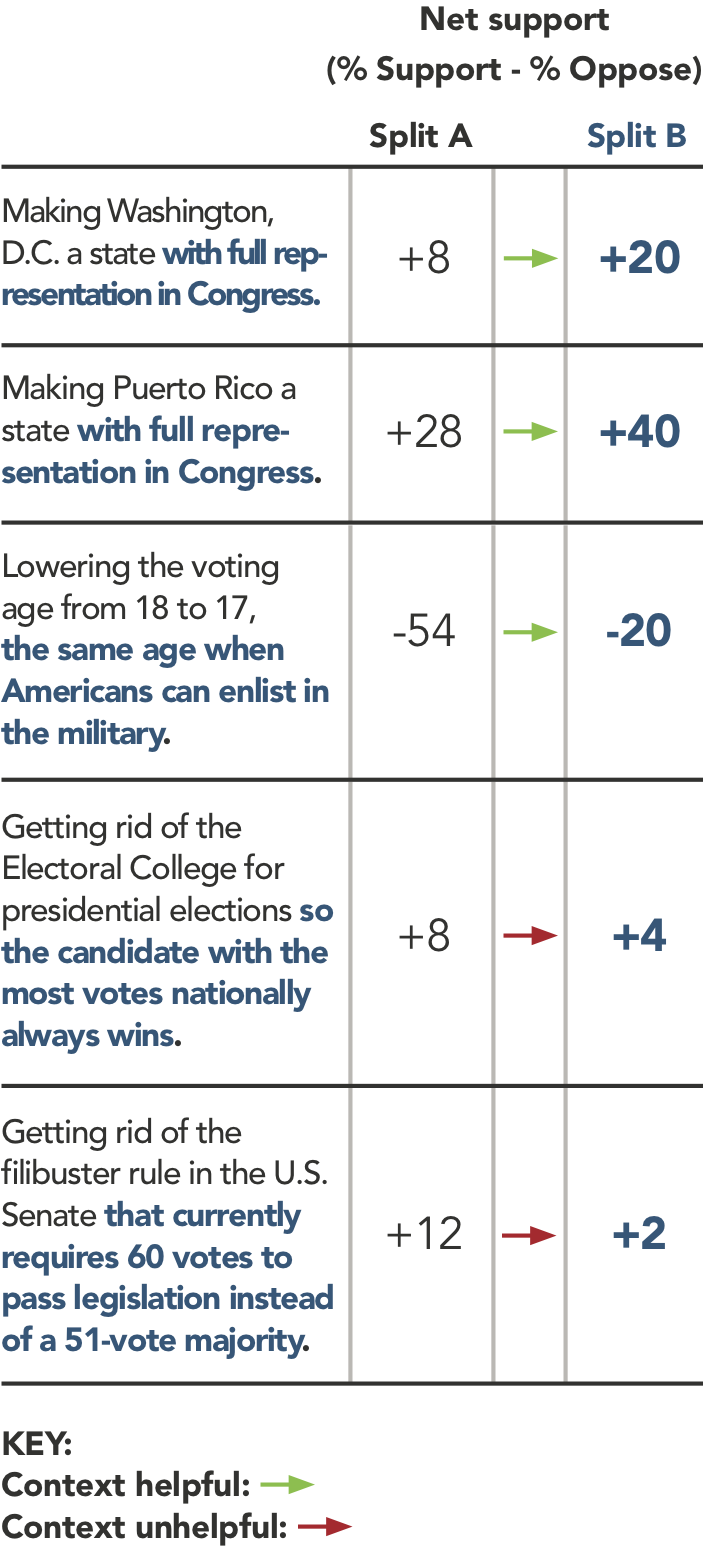
The message on D.C. statehood: “It’s taxation without representation.”
Underlining the importance of education with issues like statehood, only 39% of Americans correctly stated Washington, D.C. does not already have full representation in Congress, 29% believe they are represented; 33% don’t know.
Supporters of statehood in Washington, D.C. should emphasize these voters lack full representation and already pay federal taxes.
Two-thirds (66%) overall found a pro-statehood argument including the fact that these citizens pay taxes more persuasive than a conservative argument calling it a Democratic “power grab” – 66% of independents and even 38% of Republicans sided with D.C. residents when it is framed this way. The taxation argument is much more convincing than arguing D.C. residents have “been waiting over 200 years to have a political voice in the federal government.”
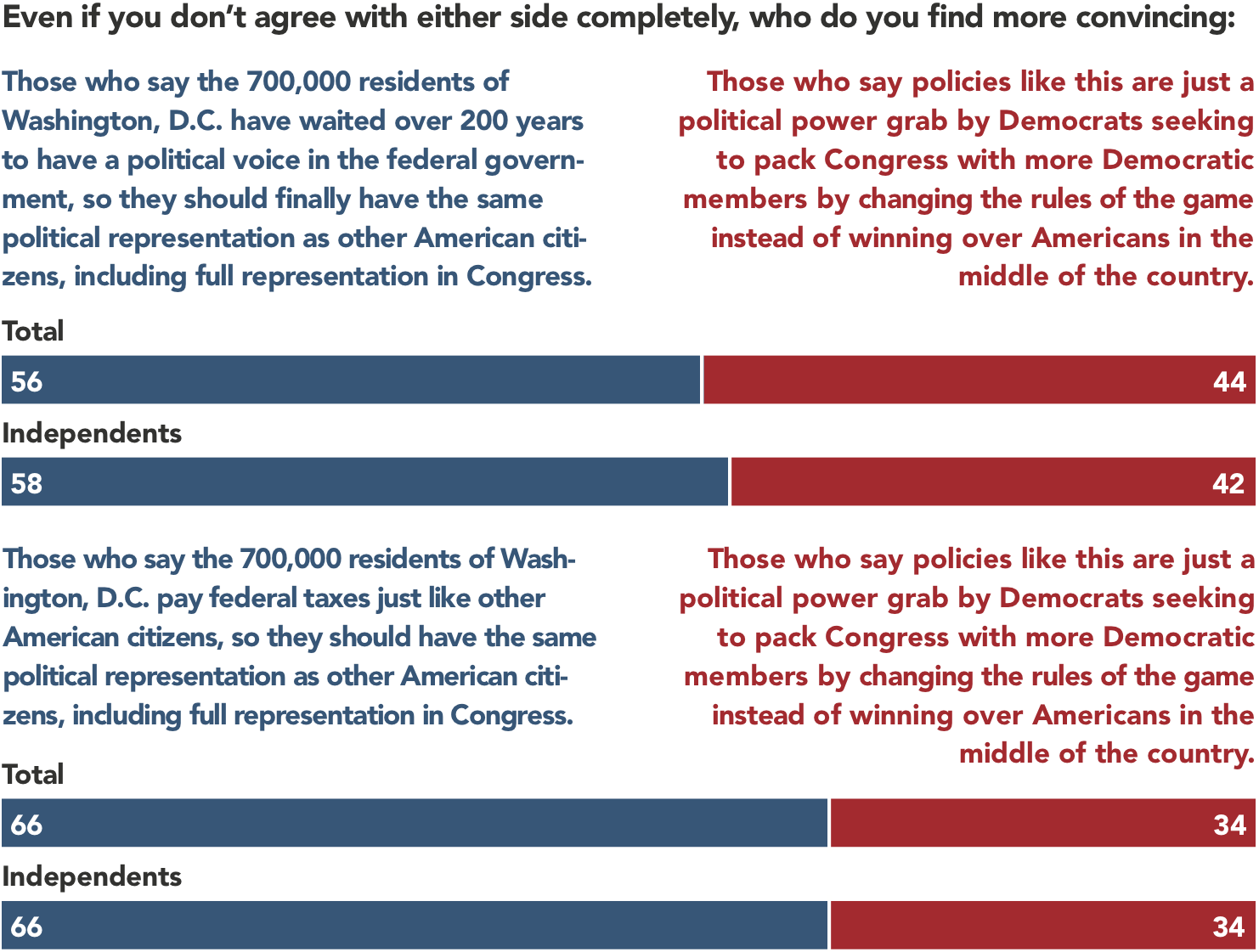
Reform “politics,” not democracy.
The reform proposals discussed so far affect different parts of America’s democratic machinery: courts, presidential elections, Congress, and the composition of the United States itself. After years of declining public confidence in the government, Washington reformers aim to rebuild trust by making government more representative and accountable.
But “democracy reform” is not the most beneficial language for its advocates. Instead, framing the efforts as “political reform” has several advantages:
Salience: Asked which is more important in a head-to-head, “political reform” decisively beats “democracy reform” (by 76% to 24%).”
Accuracy: Given a choice between the three, Americans perceive these proposals as reforming “government” (45%) or “politics” (33%) more than “democracy” (21%).
Connotation: Americans are least likely to see “Reforming politics” through an ideological lens (52% say it is neither a liberal nor a conservative idea; 30% say liberal and 18% say conservative) of the alternatives tested. “Reforming democracy” in particular is perceived as a liberal idea rather than a conservative one by 38% to 16% (45% say it is neither).
Flashback
Previous Navigator polling found Americans are less likely to think “democracy” is completely broken (19%) than “government” is completely broken (43%) and more likely to prioritize fixing government rather than democracy and the electoral process by 57% to 43%. However, this comes after decades of decline in public trust in government as well as conservative efforts to make “big government” the enemy.
Make non-partisan, non-ideological arguments in favor of reforms.
When arguing in favor of some more specific policies, such as increasing the number of justices on the Supreme Court or abolishing the filibuster rule in the Senate, progressive arguments are more persuasive when they focus on non-partisan objectives: better representation, less gridlock, and more bipartisanship.
It’s not just Republicans who prefer non-partisan arguments – Democrats, too, are more sympathetic to pro-reform arguments when the emphasis is fairness rather than progressive achievement. For example, when arguing for filibuster reform, the case isn’t that it will allow Democrats to enact their agenda. The case is that it will make sure Congress can get things done and stop gridlock.
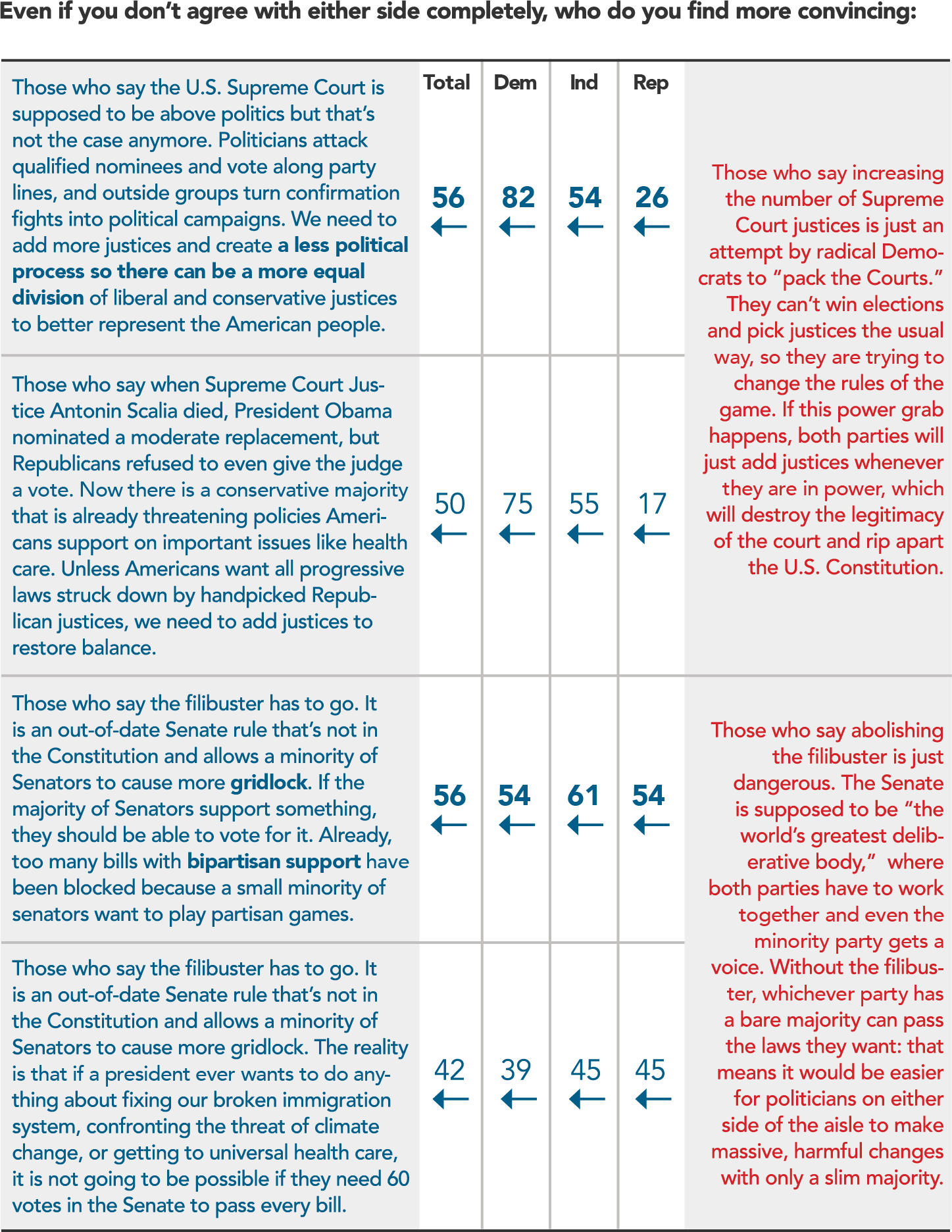
2 | Tax Day
Americans don’t see the benefits of the Republican tax law in their own returns. Progressives should continue reminding voters about the harm caused by the law.
When Navigator conducted its survey over the first week of April, most (71%) of respondents had done their taxes, ahead of the April 15th deadline – marking the first tax filing season after the full implementation of the 2017 Republican tax law. Progressives have consistently argued the law was a giveaway to the rich at the expense of working and middle class people, and now most Americans are seeing its full impact on their paychecks and tax returns.
The verdict on the tax law: a decisive thumbs down. In fact, net support for the bill fell to a new low in Navigator’s tracking to -12 (33% support, 45% oppose). The share who say their personal finances
have improved due to the bill is flat, at 19% – identical to our January Navigator survey – while the share who say it has made their finances worse has gone up by 10 points since February. Meanwhile, by 30% to 19%, those who have filed so far say they paid more than expected this year, rather than less (48% say it matched expectations). Support for the bill has also declined most among middle-income Americans (making $50,000 to $100,000 in household income), who were split on the bill two months ago (41%-39%) but now divide 35% to 45% against.
The bottom line: Americans just don’t see the benefit of this bill for their own lives and they’ve figured out Trump is focused on helping the wealthy instead of the middle class.
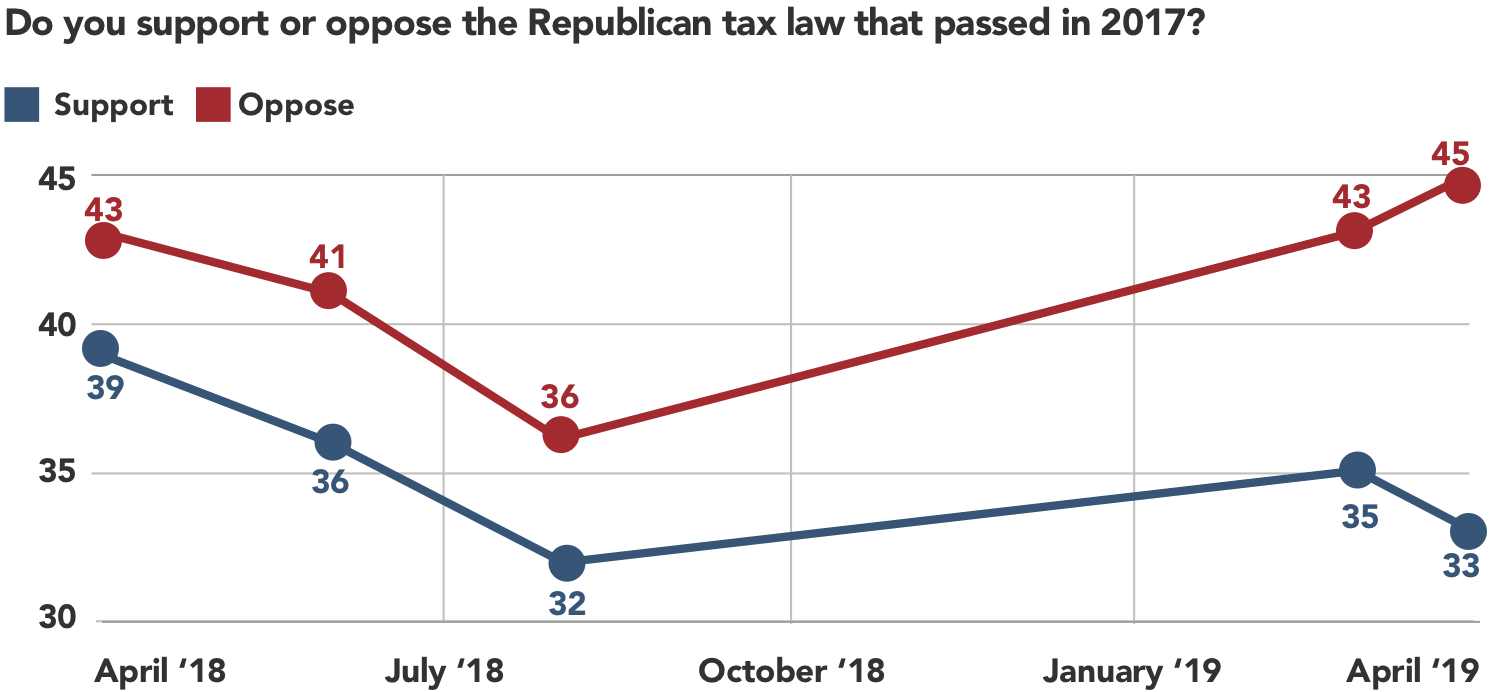
The argument for progressives: The wealthy are getting special treatment in the Trump economy.
Public confidence in Trump’s ability to handle taxes has also slumped. Democrats have a 12-point lead on the issue this month (45% to 33%), their biggest yet in Navigator’s tracking thus far. The shift is driven in part by movement among independents, who split 23% to 22% for Democrats last month but 37% to 23% this month.
By another metric Navigator has tracked for months, Americans are more likely to say Donald Trump favors the wealthy over the working and middle class by a 24-point margin, 62% to 38%. Here, independents split decisively against the president, with a 36-point lead (68% to 32%) for “puts wealthy people first.”
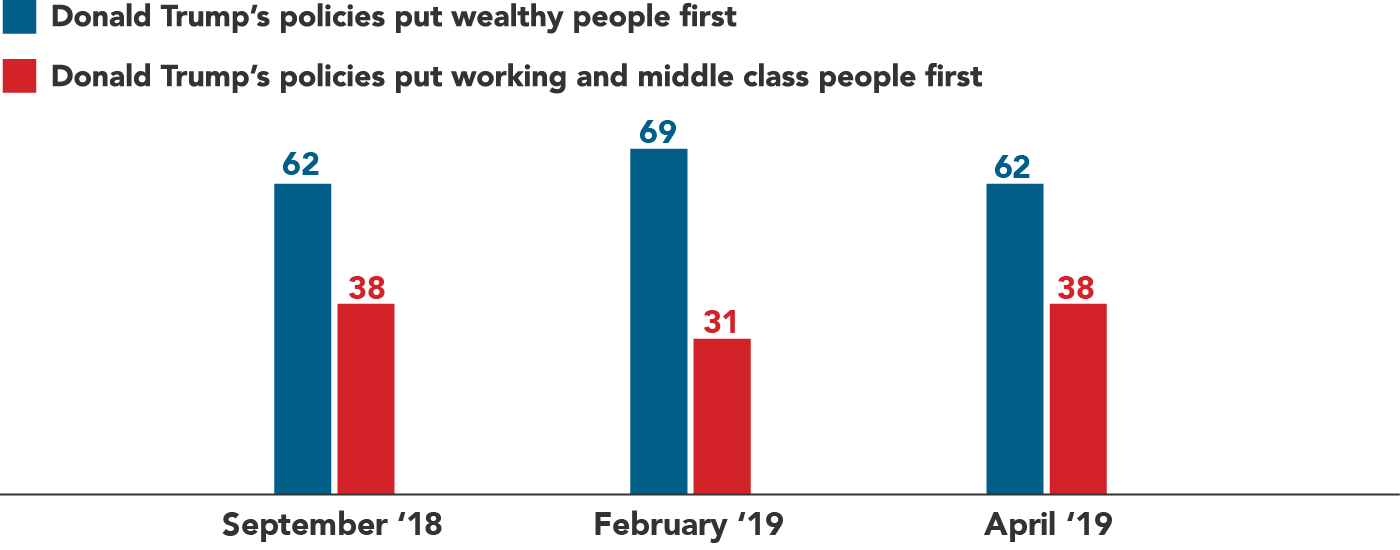
For progressives, “Trump puts wealthy people first” can be a persuasive argument, even among those who are more positive or ambivalent about other aspects of the economy. The belief Trump favors the wealthy (62%) far outpaces the number who feel personally uneasy about their financial situation (36%), give a negative rating to national economic conditions (34%) or disapprove of Trump’s economic performance (52%).
3 | Mueller Time
Inconclusive, not exonerated – the conservative talking point on “exoneration” failed to break through.
The president trumpeted Attorney General William Barr’s 4-page “summary” of the recently completed Special Counsel report as an “exoneration,” but Americans did not buy it.
Americans are very aware of the completion of the Special Counsel investigation, submitted by Robert Mueller to the Department of Justice in late March. Nearly every respondent polled (97%) had heard at least a little about the end of the investigation, including 41% who had heard a lot. The survey was conducted April 1-7, roughly a week after Barr went public on March 25.
But the share who accept the Trump administration narrative that the yet-to- be-released full report conclusively “exonerates” the president of wrongdoing is much smaller: just 30%. Most Americans either believe the report was inconclusive (45%) or don’t know enough to say (18%). Even among self-identified Republicans, nearly four in ten (38%) do not agree that Trump has been exonerated.
With so many Americans ready to “wait and see,” there is an opening for progressives to continue to make the case for continued scrutiny from Congress.
Arguments that work: point to the bigger picture.
Immediately following Democrats’ takeover of the House, Americans split evenly over the risks of overreach by congressional investigators versus the risks of lax oversight. Several months later, the public is more concerned the president and his associates will get away with wrongdoing. Views have shifted among independents, who leaned toward concern about overreach in December (36% to 32%) but now worry more about lax oversight by a margin of 11 points (46% to 35%).
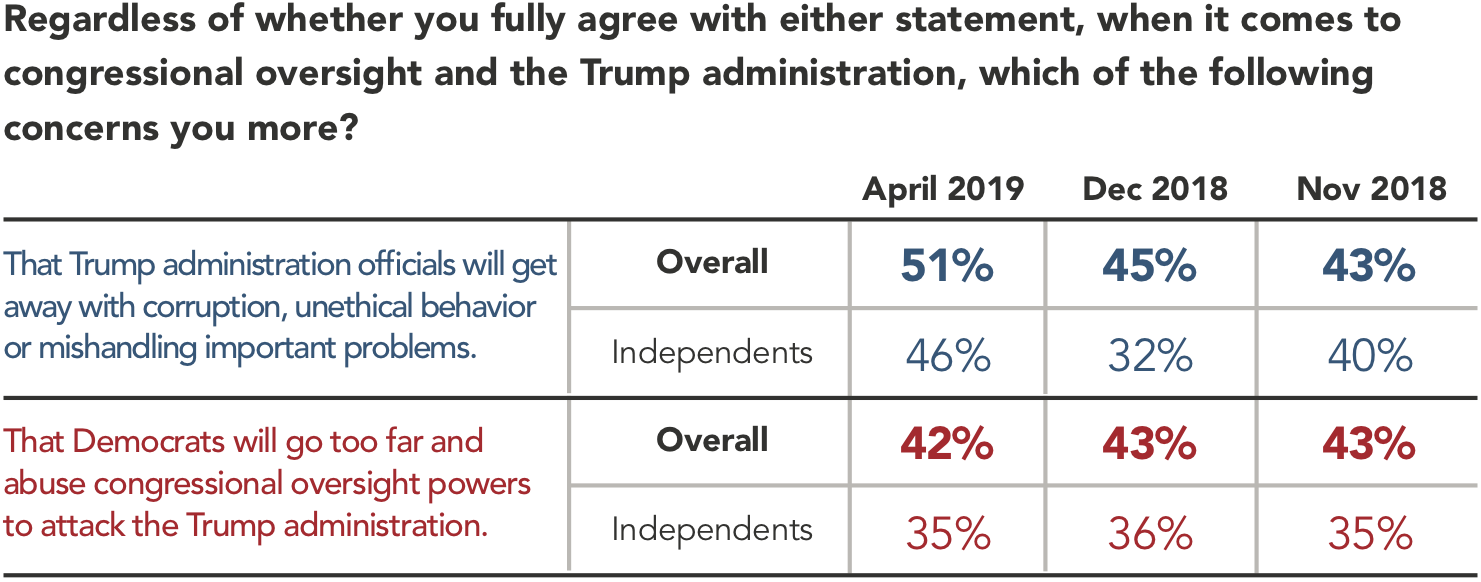
…It’s not just Mueller.
Supporters of congressional investigators should respond to Trump’s complaints about exoneration (or wasted time and money) by emphasizing that Mueller’s work was only one piece of a larger puzzle. Potential “collusion” and “obstruction” are not the president’s only problems.
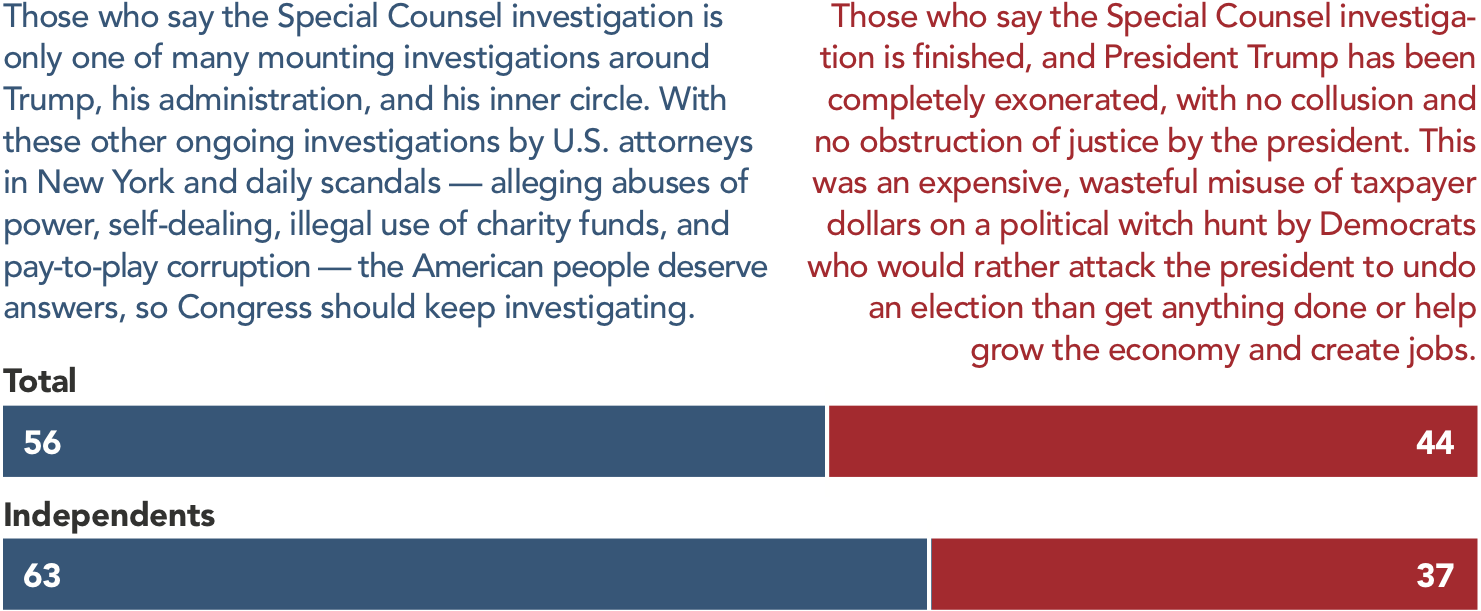
When the full Special Counsel report is released, newly revealed facts may dictate the next steps for communicators as the public learns more about the findings. In the meantime, progressives should focus on current wrongdoing in the Trump administration (e.g., obstruction and abuse of power) rather than on what may seem like re-litigating the 2016 election (e.g., collusion). In a split sample experiment, Americans were more likely to support continued investigation related to obstruction (by 50% to 40%, 49% to 33% among independents) than coordination with the Russians (45% to 43%; 32% to 48% among independents).
Bonus Points
Trump Budget Backlash
- The recently released Trump administration budget calls for major cuts to Medicare and Medicaid. For opponents of the budget, there are two potential responses: to focus on the president’s broken promise to protect these programs; or, to remind Americans about the tax breaks Trump successfully passed in 2017 for health and drug insurance companies that would coincide with public health care cuts.
- Navigator tested these two alternatives and found both raise similar levels of major concerns. With either framing, a short message about the proposed cuts is highly concerning to the public, including political independents.

Corruption and the Parties
- Democrats have regained a 10-point lead on the question of which party is trusted to “reduce government corruption,” with Democrats at 39% and Republicans at 29%. This matches the previous peak in November 2018 (post-election).
- Another measure that has held steady: 61% of Americans believe Trump has worsened corruption in Washington, D.C. rather than fixed it (39%). In the latest survey, independents split 71%-29% towards “Donald Trump is bringing more corruption to Washington,” matching a previous high from September 2018.
Rigged System (noun): When the corrupt and wealthy hold the power
- The “rigged system” has become an increasingly common motif in political rhetoric, used by both sides. But what do voters hear when public figures use the term?
- Navigator asked Americans to pick two items from a list of potential definitions for the “rigged system,” including definitions referring to political corruption, institutional dysfunction and an overbearing “coastal elite.” There was a clear winner: it’s about the corruption of politicians and the power of the wealthy.

